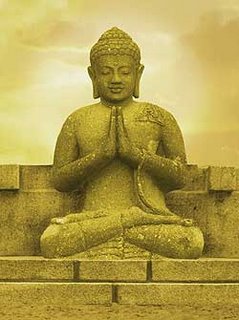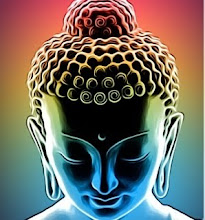
Disclaimer: I was married before I began learning about Buddhism, and I am very happy as a married person, so perhaps the following analysis is biased.Non-attachment is often spoken of as a Buddhist ideal. The Dalai Lama said once that attachment is the "root of suffering." If non-attachment and equanimity are the pavingstones of the road to
nirvana, then how can it be beneficial to get married?
I think that non-attachment is too often interpreted to as indifference and detachment. Non-attachment does not mean that one must have no love or connection to any thing or being, but rather that such love or connection should be open, accepting and non-differential. It does not mean that you walk into the ice cream shop and tell the girl behind the counter, "I'll take anything." It means that one must be willing to enjoy a scoop of black cherry on a cake cone if the store is all out of mint chocolate chip and waffle cones.
So, what does that have to do with a marriage? A marriage relationship should be a partnership of equals who respect one another's space, physically and otherwise. It is OK if one partner likes tennis and the other does not, as long as the tennis-loving partner can go play a few sets without the other partner feeling bad. It's no problem if they do not share all of the same friends, so long as each respects the other and the couple can strike a balance in how they spend time with friends and with each other.
My brother boasted to me some time ago that he and his partner had been together every day over the course of their six-year relationship. He told me this with the expectation that I would be impressed by it, but I had the opposite response. I thought it was a little sad and unhealthy. I have asked my brother out to dinner, etc., only to have him decline or (worse yet) cancel at the last minute because his partner didn't want to go. This surprised me. I always thought that there is nothing wrong with a partner going out for an evening with a friend or relative without the other person. It does not make one disloyal and it does not mean the former is abandoning the latter. I believe my brother's relationship with his partner is one laced with possessiveness and unhealthy degrees of attachment.
My husband is going to Boston (we live in Florida) for the weekend to visit his father and a couple of old fraternity brothers. Ordinarily I would go with him, but I have commitments at work that I must keep. While I will miss his company while he is gone, I do not feel jealousy or sadness that he is going. I am glad he can go even though I cannot join him. I believe that this is good, because it indicates that I can love without possessiveness.
Anyway, I have wondered about the idea of marriage and its compatibility with Buddhist principles of non-self, non-attachment and equanimity.
I welcome comments - please!





